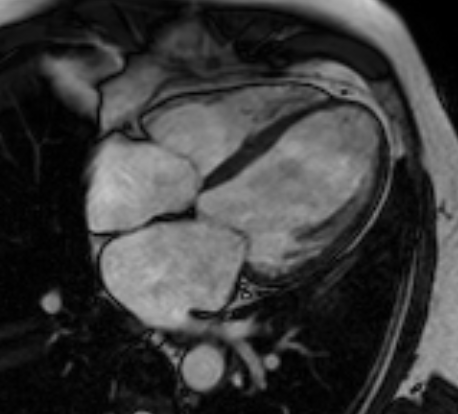
Stress Cardiac MRI What is it?
A Magnetic Resonance Imaging (MRI) exam of the heart is an advanced medical imaging technique that does not use x-rays or radiation. MRI utilizes a magnetic field and radio waves to create detailed images of the heart.
A Stress Cardiac MRI evaluates the heart for blood flow problems, scar tissue from old heart damage, inflammation of heart muscle, and for disorders such as amyloidosis and sarcoidosis that can weaken the heart muscle. Cardiac MRI does this more effectively than any other imaging test. The patient will be given an intravenous (IV) medication to dilate the arteries of the heart as images are being taken. A stress cardiac MRI exam offers unique information about the heart muscle, function, cardiac valves and structure to help your cardiologist plan your treatment and care.
Preparation for the stress cardiac MRI:
- Inform your doctor if you have any of these items: a pacemaker, aneurysm clips, metallic implants, metal fragments in your eyes or any other electronic or magnetically activated
- If your doctor has you take a relaxant medicine, arrange for a companion (family member or friend) to pick you up after your MRI. You will not be able to drive or take a taxi home after the test if you take a relaxant medicine.
- If you are pregnant or breast feeding, please notify your doctor as we will not be able to do this test.
Perfusion Cardiac MR Exam Prep
12 hours before the test:
- Avoid caffeine beverages for 12 hours prior to this test. This includes coffee, tea, soda and chocolate. You may be instructed by the nurse to hold some of your medicines.
- Do not eat any food for 5 hours prior to your exam, however water is permitted.
What to expect during the test:
When you arrive in radiology you will be asked to fill out a screening form about anything that might
create a health risk or interfere with imaging.
- You will be given a gown to change in to before entering the MRI scanning room.
- Metallic objects such as hairpins, jewelry and watches will need to be removed before entering the MRI room. Consider leaving these items at home before coming to your appointment. You will be provided with a locker for your belongings. Eyeglasses, dentures, shoes and foil lined medicine patches will also need to be removed prior to the imaging.
- You will lie down on a padded scanning table. The technologist will place EKG stickers on your chest. The nurse or technologist will start an IV in your arm. The IV will be used to give you medicine to open your heart arteries. It will also be used to give you MRI contrast (gadolinium).
- Unlike contrast agents used in x-ray studies, MRI contrast agents do not contain iodine and rarely cause allergic reactions or other problems.
- You will wear headphones to protect your hearing from the loud noise produced during the scan and to hear the instructions given by the technologist. During the scan you can listen to music through the headphones.
- The technologist will be able to see, hear and speak with you at all times using a 2-way intercom. The machine makes knocking and thumping sounds as it takes the images.
- MRI images are very sensitive to movement. Some scans require you to hold your breath for 10-20 seconds. You will be asked to remain perfectly still during the time the imaging takes place.
After the exam:
- After the test you will be observed and monitored until you are ready to go home which typically takes 15 to 30 minutes. You will be discharged with instructions regarding oral fluids, meals and resuming medicines.
- You can resume your normal activity after the test is complete if you have not taken any relaxing medications. If you have taken relaxing medications, you will not be able to drive or operate heavy machinery for the rest of the day.
How long will the test take, and where do I go for the scan ?
A Stress Cardiac MRI takes about 90 minutes from the time of the start of your appointment (including the time to prepare for the scan and scanning time) to the time you will be able to go home. The amount of time that you are in the scanner can range from approximately 30 to 45 minutes.
The exam is performed at Mt Baker Imaging, 4029 Northwest Avenue, in Bellingham.
If arriving via I-5, use exit 257.
Enter on the ground floor, on the southwest entrance of the building (the side facing Northwest Chevrolet and Home 2 Suites hotel). The MRI reception area is the door on the right after the main entrance.
